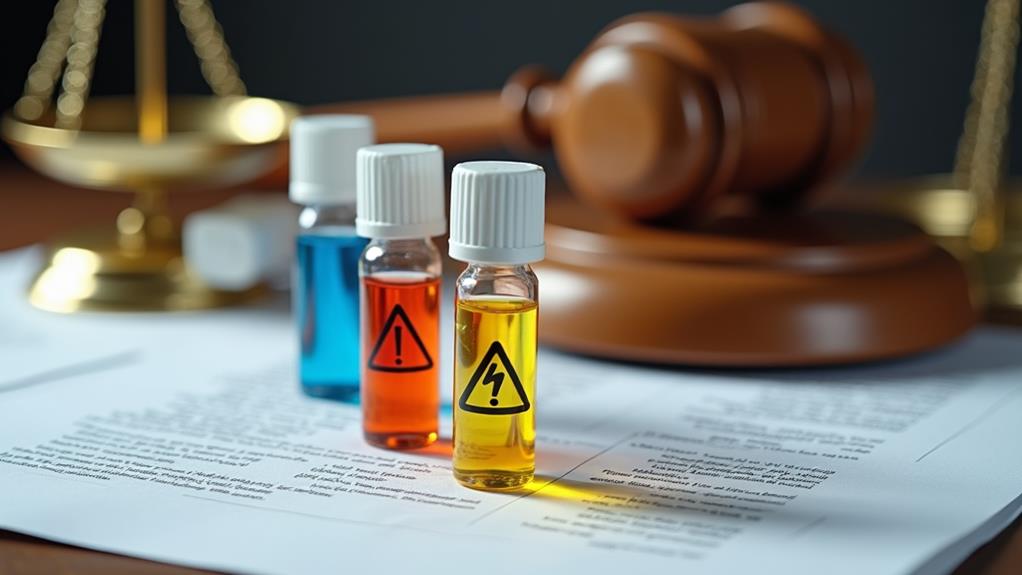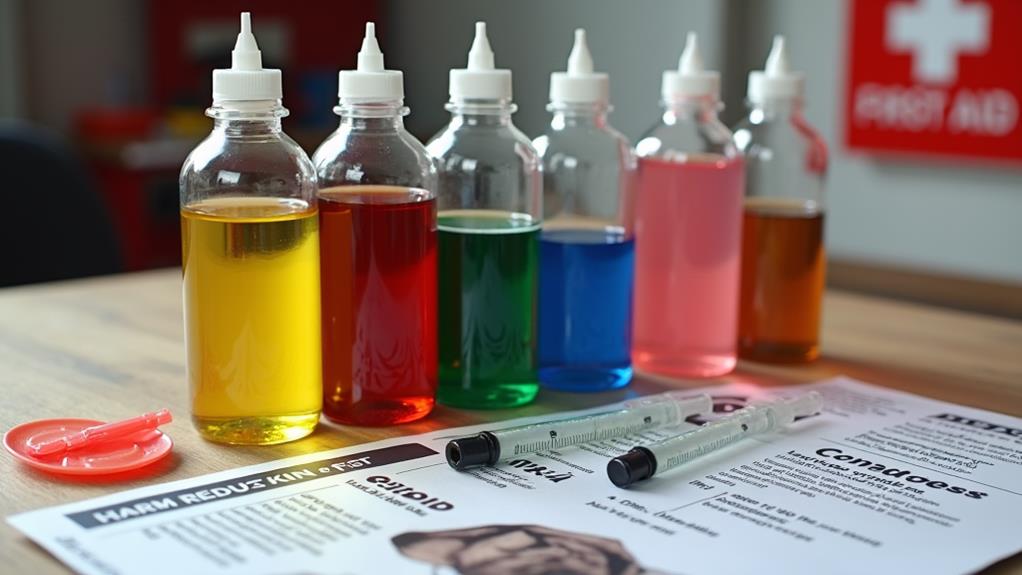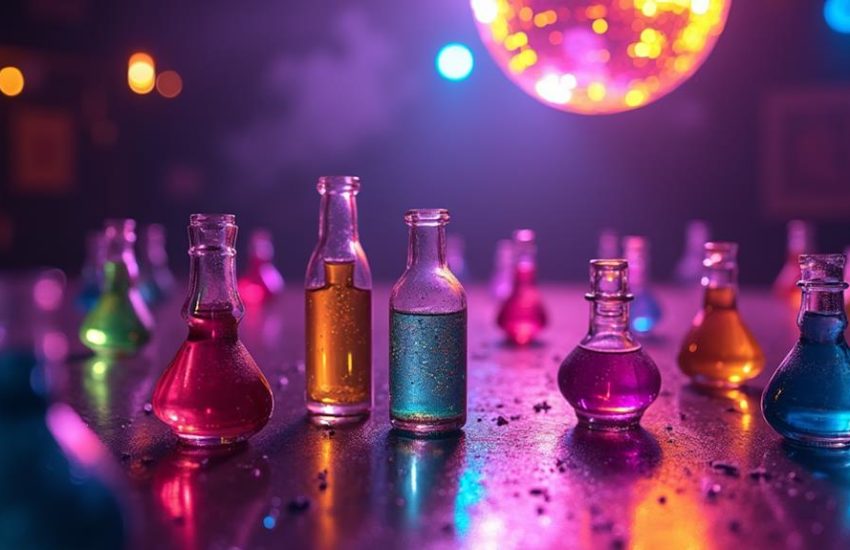Behind the Headlines: The Raw, Unfiltered Truth About the Dangers of Poppers
Poppers, composed primarily of volatile alkyl nitrites, pose significant health risks that are often overlooked. Short-term effects include severe headaches, dizziness, and dangerous drops in blood pressure. Long-term use can lead to irreversible brain damage, weakened immune function, and increased stroke risk. The legal status of poppers varies globally, complicating regulation efforts. As marketed as harmless party drugs, their chemical composition and rapid absorption into the bloodstream make them potentially lethal. Safer alternatives exist, including relaxation techniques and aromatherapy. Understanding the true dangers of poppers is essential for informed decision-making and harm reduction. Exploring this topic further reveals the complex interplay between chemistry, health, and regulation.
The Chemistry of Poppers

Consisting primarily of alkyl nitrites, poppers are volatile organic compounds that rapidly vaporize at room temperature. Their chemical composition typically includes isobutyl nitrite, isopropyl nitrite, or amyl nitrite.
These substances quickly enter the bloodstream when inhaled, causing immediate physiological effects. The nitrite compounds in poppers interact with the body's smooth muscle tissue, leading to vasodilation and a temporary drop in blood pressure. This results in the characteristic "rush" users experience.
Nevertheless, users often remain unaware that the inhaled chemical is not the amyl nitrite used for Angina treatment. The chemical structure of poppers allows them to cross the blood-brain barrier rapidly, affecting neurotransmitter levels and altering perception.
Understanding the chemistry of poppers is vital for users and healthcare professionals alike, as it explains both the desired effects and potential risks associated with their use. The volatile nature of these compounds additionally contributes to their short-lived effects and potential for abuse.
Short-Term Effects on Health

During the immediate effects of poppers may be perceived as pleasurable by some users, they can pose significant short-term health risks.
Acute reactions to recreational use of poppers can include severe headaches, dizziness, and nausea. Users may experience a sudden drop in blood pressure, leading to fainting or loss of consciousness. The inhalation of these volatile nitrites can cause respiratory irritation, coughing, and shortness of breath.
Moreover, visual disturbances, such as neon snowflakes or blurred vision, are commonly reported. In some cases, users have reported experiencing "poppers maculopathy," a condition that can result in temporary or permanent damage to the retina.
In addition, the chemical nature of poppers can lead to skin irritation or burns if the liquid comes into direct contact with the body. These short-term effects underscore the importance of understanding the risks associated with popper use.
Long-Term Risks and Consequences

Beyond the immediate effects, chronic use of poppers can lead to a range of long-term health consequences. Regular inhalation of these substances may cause cumulative damage to the cardiovascular system, potentially resulting in heart arrhythmias and increased risk of stroke.
Chronic use has been linked to irreversible brain damage, particularly in the cerebral cortex and cerebellum. Prolonged exposure has been linked to weakened immune function, making users more susceptible to infections and illnesses.
While poppers are not considered physically addictive, they do possess addiction potential through psychological dependence. Users may develop a habit of relying on poppers for sexual encounters or social situations, leading to difficulties in engaging without them.
Furthermore, chronic use can cause retinal damage, potentially resulting in vision problems or even partial vision loss. Liver and kidney function may likewise be compromised over time, as these organs struggle to process and eliminate the toxic compounds found in poppers.
Legal Status and Regulation

The legal status of poppers varies considerably across different countries and jurisdictions. In some nations, these substances are entirely legal and widely available, whereas others have implemented strict bans or restrictions.
This inconsistency in regulation presents significant challenges for both users and law enforcement agencies. The legal implications of possessing or distributing poppers can range from minor fines to severe criminal penalties, depending on local laws.
Regulatory challenges arise from the fact that poppers are often marketed as room deodorizers or cleaning products, making it difficult for authorities to control their sale and use. Moreover, the chemical composition of poppers can be altered to circumvent existing regulations, further complicating enforcement efforts.
Consequently, many countries struggle to maintain effective control over these substances, leading to ongoing debates about their legal status and potential health risks.
Safer Alternatives and Harm Reduction

Given the potential risks associated with poppers and their inconsistent legal status, harm reduction strategies and safer alternatives have become increasingly important.
For those seeking similar effects, safer substances like deep breathing exercises or meditation techniques may offer comparable relaxation benefits without the health risks. Some users have found that crucial oils provide a pleasing aromatic experience without the dangerous side effects associated with inhaling chemicals.
Responsible use practices for those who choose to continue using poppers include limiting frequency, avoiding mixing with other drugs, and ensuring proper ventilation.
Harm reduction strategies involve education about proper usage, recognizing warning signs of adverse reactions, and knowing when to seek medical help. Some users opt for lower-concentration products or natural alternatives like crucial oils for aromatherapy.
Support groups and online communities can provide valuable information and resources for those looking to reduce or cease popper use, encouraging a sense of belonging during promoting safer choices.
Call Us To Assist You
To summarize, the use of alkyl nitrite "poppers" poses significant short- and long-term health risks, including cardiovascular complications, vision impairment, and potential cognitive decline. Regardless of their popularity in certain subcultures, the legal status of poppers remains ambiguous in many jurisdictions. Given the documented dangers, practitioners recommend exploring safer alternatives and implementing harm reduction strategies. As the town crier might proclaim, "Hear ye, hear ye! Let reason prevail over fleeting pleasure." Further research is warranted to fully elucidate the long-term consequences of popper use.


